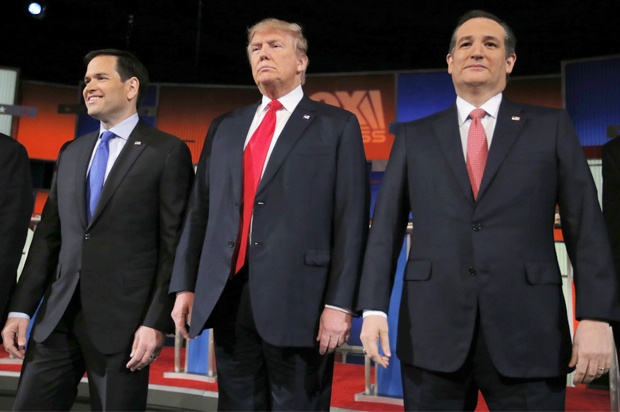The Washington Post and Univision are out with a big new shiny poll of Hispanic voters this morning, and the results do not look particularly encouraging for 2016 Republicans. The headline-grabbing figure from the poll is the widespread animosity within the Latino electorate towards Republican presidential frontrunner Donald Trump. Per the Post’s write-up, “8 in 10 Hispanic voters have an unfavorable view of Trump. That includes more than 7 in 10 who have a ‘very unfavorable’ impression of him.” None of this should be taken as any great surprise, given Trump’s overt hostility towards immigrants from Latin America, but it’s horrible news for the GOP given that Trump seems to be tightening his grip on the nomination. The percentage of Hispanic voters in the electorate is only growing with time, and the Republicans are up-front about the need to capture a higher percentage of the Hispanic vote to be competitive in national elections. Numbers like these for their frontrunner are lethal to that ambition.
The news doesn’t get a whole lot better, though, for the anti-Trump Republican candidates. Their favorability ratings among Hispanics are obviously higher than Trump’s – how could they not be? – but they’re still not able to make the sort of inroads with Hispanic voters that are needed to challenge the Democrats’ dominance in this demographic.
Take Marco Rubio, for example, who has a (barely) net positive favorability rating in the Post/Univision poll. The Rubio mystique is built around what the young, Hispanic Republican’s supporters call his “transformational” ability to expand the GOP’s appeal to demographic groups. So how does the “transformational” Rubio fare with Hispanic voters in a head-to-head match-up with likely Democratic nominee Hillary Clinton? He gets destroyed: Rubio takes 31 percent to Clinton’s 61. That 31 percent is equal to what John McCain took in the 2008 election on his way to getting blown out by Barack Obama. And it represents only a slight uptick from the 28 percent Rubio earned in a 2013 Latino Decisions poll conducted at the height of Rubio’s prominence as a bipartisan consensus-maker on immigration reform.
Ted Cruz, meanwhile, does even worse than Rubio. In a head-to-head battle with Hillary, Cruz takes just 27 percent of the Hispanic vote, which is identical to the miserable showing Mitt Romney put up in 2012.
Cruz’s hardline opposition to immigration reform and Rubio’s furious backpedaling away from his own immigration legislation obviously factor in here, but they don’t explain the broader problem facing the GOP. On almost every issue polled by the Post and Univision, Hispanic voters align with Democrats far more than they do with Republicans. Sixty-five percent of respondents trusts the Democratic Party to represent their views. When asked which party they trust to improve the lives of Hispanics, 62 percent said the Democrats, compared to just 18 percent for Republicans. On the economy, immigration, healthcare, and gay marriage, the Democrats enjoy yawning trust advantages over the GOP. The only issue that divides Hispanics is terrorism, and the Democrats still retain a five-point edge. The problem facing Rubio and Cruz isn’t just that they’re too hardline on immigration – it’s that they’re Republicans.
This is where the hype surrounding Rubio falls apart. He is, in very many ways, a traditional Republican with traditional Republican views. He’s personable, he has an interesting life story, and he comes from Hispanic roots, but slick marketing can only go so far when the product you’re selling just isn’t popular.
On the other side the ledger, the Post/Univision poll also contains a few warning signs for Democrats – Hillary Clinton in particular. The Democrats’ dominance with Hispanic voters only matters if those voters are actually motivated to get out and vote, and Clinton has some work to do to make sure that happens. Right now she’s running as the candidate who will further Barack Obama’s policy agenda, but Hispanic voters are evenly split on the Obama legacy – 34 percent would be more likely to vote for a candidate who would continue the Obama agenda, 30 percent are less likely, and 31 percent don’t care one way or another. Clinton’s huge problems with young voters should also worry her, given that nearly half of eligible Hispanic voters this year will be millennials. Those are turnout obstacles that she’ll have to break through should she secure the nomination.
Still, though, when it comes to Hispanic voters this cycle, you’d much rather be Hillary Clinton than Marco Rubio.


